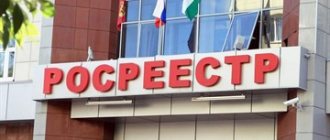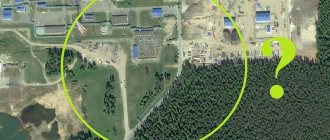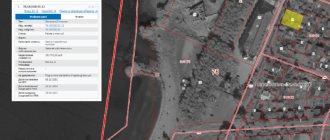History of the cadastral industry
In short, the problem of real estate accounting has existed for a long time, and the first mention of it dates back to the 10th century. The word “cadastre” itself has Latin roots, and in all languages it has the same meaning - it is a kind of inventory or list. At the same time, it is a universal and easy-to-use form of accounting.
1765: a state commission was created in Russia to determine the boundaries of land plots. The commission had a huge amount of work ahead of it, which it completed only by the beginning of the 19th century. As a result, data was collected not only on land plots, but also on forest resources, urban lands, and even on each individual farmstead.
During the era of the Soviet Union, land records were almost not kept, because all land at that time was considered common. There were only technical inventory bureaus that kept records of various buildings.
1997-1998: the field of registration of real estate and rights to it began to take shape. Roskadastre was created. Later, the Unified State Register of Real Estate Rights (USRE) and the State Real Estate Cadastre (GKN) appeared. Each of these organizations performed its own functions, but they largely repeated each other. To receive services from Rosreestr, it was necessary to submit the same documents twice.
In 2015, Federal Law No. 218 “On State Registration of Real Estate” was adopted, in which these two structures were combined into one.
Now any person or any legal entity applies only to Roskadastre with an application and receives all services according to it. He is given an extract from the Unified State Register of Real Estate (USRN).
Cadastral engineer services
The provisions of the Federal Law “On State Registration of Real Estate” dated July 13, 2015 N 218-FZ also speak about the basis on which the activities of cadastral engineers are carried out - for this, a contract agreement must be concluded under which the specialist undertakes to perform a certain list of cadastral services. It is worth noting that along with the increase in the powers of cadastral engineers, their responsibility has also become stricter.
What is included in the cadastral services provided by an engineer? First of all, this is the preparation and transfer, in agreement with the customer, to government authorities of the documents necessary for registering real estate objects with cadastral registration. In addition, the list of services of a cadastral engineer includes the following:
- measuring work;
- preparation of inspection reports of objects;
- services of a cadastral engineer for the preparation and submission of technical and boundary plans to the territorial departments of the cadastral chamber;
- confirmation of the presence/absence of capital signs of the object (preparation of the necessary certificates and technical reports).
What is the cadastre, its contents
The real estate cadastre is a collection of all information about real estate and the borders of our state, the borders of all regions, cities, towns, villages, and other settlements and territories.
All information stored in the cadastre can be divided into 2 parts: I. Basic information:
- what type the object belongs to;
- what is its number in the cadastre;
- when information about him is entered;
- when the property was registered;
- what are her boundaries?
- where is it located;
- what is the area
Concept of Real Estate Cadastre
The state real estate cadastre is a systematized, automated recording of information about real estate, including the state border between the Russian Federation and other countries, constituent entities of the Federation, municipalities, and populated areas.
GKN is a state information resource.
Its main purpose and essence is to organize the circulation of rights registered in the Unified State Register of Rights to Real Estate and Transactions with It.
Normative base
The activities of the State Control Committee are regulated by the following regulatory documents:
- Land Code of the Russian Federation. Its articles define the types of land ownership, the levels of participation of government bodies in land issues, the rights of land owners, the principles of land accounting, and the procedure for resolving various disputes.
- Forest Code of the Russian Federation. It establishes the fundamentals of forestry management.
- Civil Code of the Russian Federation. This is the law of the Russian Federation regulating relations in the civil legal sphere.
- Housing Code of the Russian Federation. This is the main law in the sphere of regulation of relations related to all types of residential and non-residential premises, their proper use and the rights of Russian citizens in this industry.
- Water Code of the Russian Federation. This is the law regulating rights and obligations in the field of water use. It presents all water bodies as one of the key components of the environment. The main objective of this code is the conservation of all aquatic biological resources, as well as flora and fauna living in this environment.
- Town Planning Code of the Russian Federation. This is the basic law that regulates all rights and obligations in the field of urban planning in Russia.
- Federal Law No. 221 “On the State Real Estate Cadastre” dated July 24, 2007.
- Constitution of the Russian Federation.
Legal regulation
Issues related to the State Real Estate Cadastre are regulated by special regulatory legal acts. The main one is the Federal Law of July 24, 2007 No. 221-FZ “On Cadastral Activities”. It regulates the relationships that arise in the process of carrying out activities of this nature. Also, some points related to the State Property Committee are reflected in the Federal Law of July 13, 2015 No. 218-FZ “On State Registration of Real Estate”. For example, Article 8 reveals the very concept of such accounting and its content. Some issues related to the State Property Committee are also reflected in the Land and Town Planning Codes of the Russian Federation, and Decree of the Government of the Russian Federation of June 1, 2009 No. 457 “On the Federal Service for State Registration, Cadastre and Cartography.”
Goals, purpose and principles of activity
The main goals of the State Control Committee are to ensure:
- registration or deregistration of any real estate;
- centralized accounting of lands and control of their use;
- development of measures for planning and regulation of land use;
- assessment of the value of this type of property;
- centralized registration of rights;
- legal protection of the rights of all individuals and legal entities related to the use of real estate;
- access to complete and reliable information.
The main purpose of the State Property Committee is the mandatory presence in the register of reliable information about the characteristics of any real estate object and data about its location.
The activities of the GKN are based on compliance with several important principles:
- Unity of accounting and control technology throughout Russia.
- Relevance and accessibility of all data in the register to any individuals and legal entities (except for data that is a state secret).
- Systematic updating of information.
- Comparability of all information in the real estate cadastre with data from other government bodies.
State Real Estate Cadastre
Over the past 10 years, government policy aimed at modernizing all life support systems of the country has been bearing fruit. In particular, a new taxation system has been developed and implemented, which allows taxes to be collected in proportion to the profitability of the subject and the value of its property. This system is regulated by the GKN.
The State Real Estate Cadastre is an information base that contains all the information about the registered property of the country, as well as information about the borders of the state.
Including information about:
- real estate of individuals and legal entities;
- state property;
- borders of the Russian Federation, relative to neighboring countries;
- borders of the country's subjects;
- municipal boundaries;
- boundaries of settlements - cities, villages, villages, etc.
- special purpose zone, etc.
The State Property Committee is an information base that centralizes the circulation of rights to any real estate registered in the Unified State Register of Real Estate (Unified State Register of Rights to Real Estate and Property Transactions).
The procedure for recording property involves entering into the register data about an object that has individual characteristics, this allows it to be defined as a unique existing thing. The termination of such existence (liquidation of the object) is also taken into account.
The performer of cadastral activities is an authorized representative with a degree in cadastral engineering. Based on the opinions of engineers, all movements on real estate are carried out. This includes land surveying, cadastral value assessment, issuing permits for putting buildings into operation, etc.
Objects and subjects of the State Control Committee
Objects in the cadastre are all areas on the surface of the earth, underground areas, and various areas of the water sphere. A distinctive feature of all these objects is that they cannot be moved to another location without causing them damage or damage. Also objects are forests, artificial plantings, etc.
A plot of land has mandatory characteristics - it is located on the surface of the earth, and its boundaries are clearly defined in accordance with the requirements of the law. Other real estate objects include all artificially erected buildings both on the ground and under it, the movement of which without causing harm is also impossible.
Subjects in the cadastre are all citizens, legal entities and various business organizations. They are divided according to the form of ownership rights and economic status. In the cadastre, all property is divided by conventional boundaries between regions. This information is encoded, and each object has an owner identified. The subject refers to copyright holders who have the right to own, use and dispose of the object. The subject can be endowed with an unconditional form of ownership - the owner, as well as a conditional one, that is, lifelong ownership without the right of transfer by inheritance or with the right of transfer.
How the new GKN works
Currently, the State Property Committee and the Unified State Register work together and perform the following functions:
- Registration and storage of all information on real estate objects.
- Registration and storage of all information on rights and encumbrances on land.
- Registration and storage of information about the boundaries of land plots.
- Accounting for cadastral affairs.
- Accounting for cadastral maps.
- Registration of Roskadastre documents.
Now the real estate cadastre combines several structures, each of which deals with its own tasks, in accordance with Federal Law No. 218 of 2015.
The Federal Law came into force in full only in 2021. Certificates of state registration ceased to be issued in 2015.
Our specialists
Cadastral engineer Shutov Valentin Sergeevich Experience more than 15 years
Cadastral engineer Makhanov Denis Valerievich Experience more than 15 years
Cadastral engineer Valery Arkhipovich Makhanov More than 15 years of experience
In accordance with changes to the Cadastre Law (221-FZ), which came into force in January 2014, all cadastral services related to the registration of real estate objects with cadastral registration, preparation of a technical plan, etc. Now only cadastral engineers with the necessary qualifications and state certification have the right to provide (previously this also fell within the scope of BTI activities). Such engineers - authorized persons - can engage in professional activities individually, or be on the staff of specialized companies - in any case, it is legally impossible for other persons to perform cadastral services.
What power do previously issued documents have?
Not a single regulatory act says anything about the fact that documents previously issued by Rosreestr lose their validity. But you need to take into account a number of notes when making new real estate transactions:
- When making such a transaction, you must order an extract.
- It is advisable to order an extract from the Unified State Register of Real Estate once every 3-5 years in order to receive updated information, if any appears in Roskadastre.
If any changes occur in it, the property owner is not notified about it. You can find out about such changes only by personally applying for an extract.
All owners are recommended to independently submit information to the register on the updated cadastral value of their property by 2021. If this data is not submitted, then Roskadastre will conduct a revaluation of the property itself.
For the release of any information, a fee must be charged in the amount established by law.
Regulatory framework
The formation and regulation of cadastral activities are based on legislative acts.
All cadastre issues are regulated by 221-FZ “On the State Real Estate Cadastre”. It spells out issues of Rosreestr, engineers and their associations, accounting and powers of the parties.
This is not the only document regulating cadastral activities. Other regulations are also intended to solve this problem:
- Constitution;
- Civil Code;
- Housing legislation;
- Forest and Water Code;
- Urban planning legislation, etc.
All actions in the state real estate cadastre can only be carried out by the registration and cadastre service of the Russian Federation.
A citizen can obtain information from the cadastre in two ways:
- using the Rosreestre portal on the Internet;
- by making an official request to the cadastral chamber.
Information obtained on the Rosreestr website cannot be used in legal disputes; to go to court, you must have an official document with a signature and seal.
Both individuals and legal entities can apply for such a document . The application must indicate the reason for the application and the applicant’s personal data.
It must be accompanied by copies of your passport, certificate of ownership, site plan and other documents, depending on the purpose of the application.
Important nuances
It happens that errors are made in registration documents. They need to be corrected. To do this, you need to fill out an application notifying about the error and provide it to a Rosreestr employee either through the public services portal or by mail. You will also need to attach a package of documents confirming the presence of the error. You will not have to pay state duty. 5 days are allotted for consideration of such applications. After consideration, the applicant will be notified of the decision by letter with the result of the verification. Then the owner of the property will be sent a copy of the corrected document and a cadastral passport. If the error is not confirmed, neither the applicant nor the owner of the object will be notified. If the applicant is not satisfied with this decision, he will be able to go to court. If the court refuses, then you will have to appeal to a higher authority.
There are situations when the owner is obliged to contact Rosreestr:
- The area of the site changes.
- The address of the object changes.
- Construction has finished.
- The new cadastral value must be reported.
- New objects have appeared that need to be registered.
- It is necessary to deregister liquidated objects.
- The object's purpose has changed.
- A restriction has been placed on the object.
- The name has changed.
To do this, a document on ownership, as well as some additional documents, is submitted to Rosreestr. Their list for each situation will be compiled individually. The period for making changes is 18 days. If the application was made through the MFC, the period increases to 21 days. Cost of the service: for individuals – from 200 to 800 rubles, for legal entities – a higher rate.









